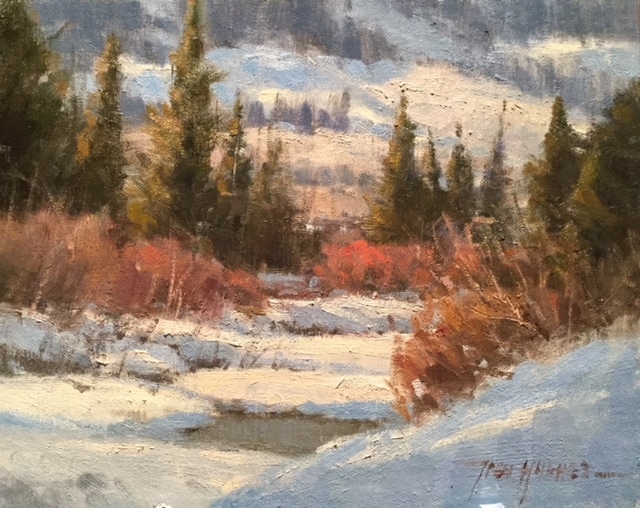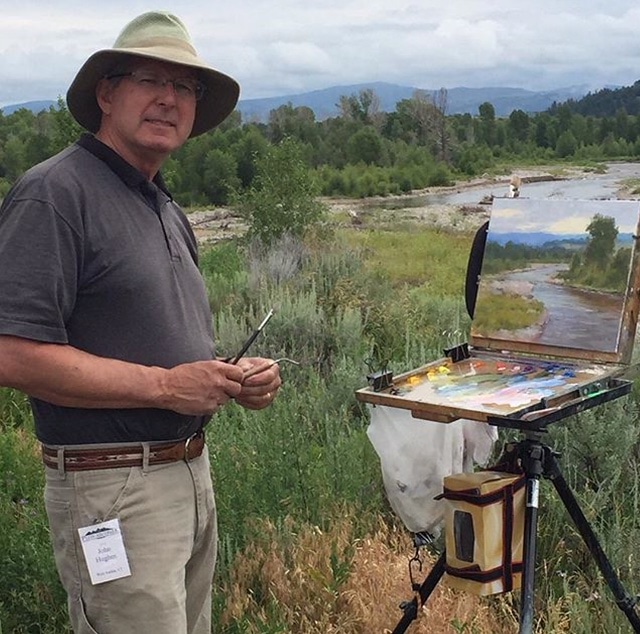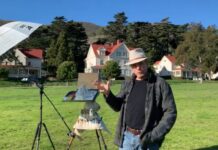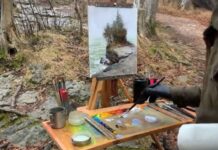John Hughes shares why he hopes he never loses his enthusiasm for learning more about making art, because “that would surely spell disaster.”
One night, my college painting class and I discussed a subject that was interesting and insightful, with regard to the term “student.” They seemed to feel a sense of relief when I told them that although the word has somehow gained a negative connotation, it should not be regarded that way when it comes to making art.
The term “student” often conjures up a picture of a “rank beginner” or “bumbling neophyte” who doesn’t know which end of the brush to hold. We talked about how each of us should be students of painting throughout our whole lives because the act of painting is a constant battle of design elements, coupled with the properties of light, and the means to express those objectives artistically. This battle starts when the first brush mark is placed on a blank canvas and doesn’t end until the last stroke is laid down.
I call it a constant battle, not wishing to give the false impression of something distressful like trench warfare, for it is a battle more in the sense of a game of chess, which is both rewarding and exhausting at the same time. It’s a battle of human wits against the ever-devolving impulse to say, “That’s good enough.” It’s a battle with a happy ending and one that should be savored every step of the way! Yes, it’s no ordinary struggle, because it’s one of “process,” and process is just as important as the product it produces in painting!

I have often remarked that there is a certain emotional let-down when a painting is done. It sometimes feels like you have just said goodbye for the last time to an old friend, or just concluded an exciting chapter in your life. While the painting itself is awfully satisfying to behold, it’s the satisfaction of the process that often towers over the whole experience. It might be similar to the thrill of performing, just like a musician at a concert — when the curtain finally goes down, there is a certain yearning for the next event to begin.
To be painting at our peak performance requires patience, strategic awareness, and persistence at a level that is at times mentally and physically exhausting. Is is, however, one where the rewards for our efforts are hard to pen, in any meaningful way. This type of battle is not drudgery to most serious students of art, but the kind of activity that inspires the human mind and soul to greater heights and future challenges.
I can’t say enough for being a student of the arts and of life. The word “student” should be a badge of courage to all of us, and one to be worn proudly at that! I hope I will never lose my enthusiasm for learning this craft, because that would surely spell disaster.
We talked further about how none of us ever reaches total knowledge in anything, and painting is no different. I told them that I hope I never get there, because if any of us ever knew it all, when it comes to painting, we would probably give up and start selling used cars out of sheer boredom. That one got a laugh! (No offense intended to anyone in the car sales business!) I don’t think there is much in this life that can’t be exciting, if we put this level of effort into it.
So, to all of my fellow students out there, I say keep striving! Be willing to latch on to every tidbit of knowledge, no matter how small a morsel, or how large a vein of understanding you are able to uncover. In this sense we are all like silver and gold miners, who keep digging in hopes of finding the mother lode.
We live in an age that has occasionally been described as one where people are “swimming in information, but drowning in ignorance.” Quite frankly, I have found serious painting students to be an entirely different breed. We tend to spend inordinate amounts of time squirreled away in our studios and out in nature studying and dissecting what makes the visual world tick. We glory in the discovery of a rare old book by an esteemed artist of the past. We spend massive amounts of hard-earned cash on art classes, drawing, workshops, and painting videos to propel our understanding just one inch further, and we keep coming back for more.
I have been privileged to know some of the finest painters in this country, and most, if not all of them consider themselves to be students. So the next time someone refers to you as a student, try not to bristle at the thought; stand a bit more erect and stick your chest out, because you have just been given one of the best compliments of your life.
Visit EricRhoads.com to find out all the amazing opportunities for artists through Streamline Publishing, including:
– Online art conferences such as Plein Air Live
– New video workshops for artists
– Incredible art retreats
– Educational and fun art conventions, and much more.
> Subscribe to Plein Air Today, a free newsletter for artists
> Subscribe to PleinAir Magazine so you never miss an issue






Thank you for telling me it is OK to continue seeking knowledge from those I deem better artists. Moments ago I read something saying “…some artists, like many non artists, are eternal students, which makes me wonder why. Are they afraid to go out on their own?” This made me momentarily question myself. But that’s like a dare to me – I dug my heels in, decided not to respond, blow it off, and continue in what I think is best for me.
I love learning, always have. Otherwise I get bored; and I want to grow in my art. Learning and painting are the only ways I see to do that. I am proud that I prefer to spend my vacation time learning in workshops, night school, books or videos. I thrive on and am inspired by workshops. And, I have been fortunate enough to spend time with some wonderful, brilliant, memorable characters.
Everyone needs to do what works for them.
Sandra, Thank you for your thoughts on this subject,, I appreciate what you have to say! John-
As one who can easily describe myself as a “bumbling neophyte”, I loved your description of us all being like silver and gold miners, who keep digging in hopes of finding the mother lode. Whenever it is difficult to create the right color, paint a subtle sky, or catch the character of a tree, I want to run to a book or painting by a master to study how a he has done it. Great article, John!
Thank you Beckie!